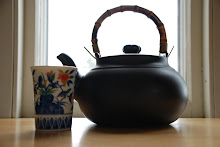
I drive to work each morning flanked by lines of trees on each side. They seem to march onward with me, my companions along for the ride. A maple, bearing more brilliant leaves than his laggard brethren, draws my attention. In the suffused morning light, the colors are otherwordly, and the scene takes my breath away.
The heralds of fall are everywhere. There are the poetic ones: leaves saturated with colors or ripe apples on arched boughs. And then there is the comical autumnal announcement: a billboard on an interstate highway proclaiming that the leaves have reached 5% of their peak color this week. I wonder, will they attain 17.35% next week?

Gibes to the state's bureau of tourism aside, this season is a glorious one, and its waning light of day draws me closer to home and to my pot of tea.
Today, it is lots of sencha, one called Kawane 1st Flush Hatsu Yamaka (sadly, I no longer see it available in Rishi's online store). The tea comes in an eye-catching tin foil packet festooned with Chinese characters against a background of floral designs. I tear open the top of the packet, careful to keep the bag relatively intact. I scoop out a spoonful of the leaves. Delicate strips of deep green, I think of bite-sized bits of nori as I breathe in the scent.
The first infusion brews up a delicious cup of sencha: grassy, subtly sweet, and barely astringent. Further infusions accentuate these characteristics and efface a fleeting bitterness.
I drink the tea, savoring each sip, and continue to examine the packaging of this sencha. As I smooth the crinkly pressed-foil between my fingers, its metallic glint looks familiar to me. Little red shiny envelopes similarly etched with gold characters, I am transported to my childhood on the Lunar New Year, the Vietnamese Tet.
There was the aroma of glutinous rice cakes wrapped in banana leaves. I flitted around excitedly in my holiday finery awaiting the moment when the little red envelopes would be passed around to the children of our household.
That moment came, and I filed past the adults, receiving a pat on the head from one, a pinch on the cheek from another. They each placed in my hand the long-awaited red envelope.
Once I amassed my treasures of the day, I would in the quiet of my room admire their variegated designs, their wrinkle-free newness. Inside the envelopes were, of course, small sums of money. I breathed in the scent of freshly minted coins and bills, the smell of which I have invariably associated with Tet to this day. One by one, I deposited coins and bills into the modest-sized slot atop my rosy-cheeked piggy bank. The porcelain pig then sat happily engorged on a high shelf while I played with my red envelopes.
And now, as I drink my third cup of sencha, I linger over memories invoked by a golden glint, a familiar touch, and finally, that jolt of recognition.







